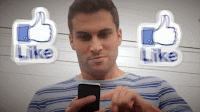THIS week I'm going in on technology and screen time for a bit. They're bloody slithering into every facet of our lives aren't they? This subject has popped up in my life a lot lately; from noticing my lack of sleep, to learning how devices engineer addiction, to considering how algorithms limit our search control. It's scared me as a (fairly) pessimistic futurist (but a pretty positive person in the present). I want spread some awareness of their effects and help us attain balance with our device usage...
BE AWARE OF THE CASINO
The addiction is real. There's so many tricks these beautiful bast*rds use to keep us engaged. All the fun filters, the red hearts, the vibrations, the endless page-scrolling feature... you name it. Welcome to your personal casino, feeding you content you're probably interested in, trying to sell you trainers you actually quite like. It's been proven that our devices and their engineered systems leverage our brain's reward system. The neurotransmitter, dopamine (the high, a feeling of pleasure) is released in response alerts and notifications. Forbes explains this really well and why the ex-Google employee, Tristan Harris got outta there to work on a new tech-conscious initiative. Known as "brain hacking", Harris says that we've all been made to think tech is neutral, when actually, it's manipulative as hell.If that isn't sign enough, the guy who invented Facebook's 'LIKE' button, Justin Rosentein recently decided to block all apps on his phone. He claims that social media is "having a detrimental effect on people’s cognitive ability as they adapt to the growth of the attention economy." Why Can't We Stop Looking At Our Phones? is also a great BBC podcast ep on this.
(The above work is Dopamine Shot. Watch it here.)
MOTHS TO A FLAME
Don't be a moth. Moths scramble frantically towards the light, so desperate to get a fix, they look (and probably feel) quite stupid. Smartphone light is pretty counterintuitive to 'switching off' – the blue glow has been known to interfere with sleep cycles. Take the screen brightness down to a level you can manage; try and it keep it there in general (also good for your battery!). It can also help to keep your phone out of sight through the night (I'm a sucker for this). I shove it under my bed so I can still hear the alarm, but not next my pillow... (could improve this). To end, for those who suffer from sleep issues: don't be a moth at bed time.
(Above image by @ri.le)
RE-CONNECT WITH YOURSELF
Smartphones and computers can distract us and take us away from ourselves on a regular basis. We've gotten used to learning everything online and less so from our innate human ability. Navigating our real lives/ the physical world is not as native because we are less attuned to our instinctual abilities. *Sigh* my children (who'll come straight out the womb with an Apple watch and not know how to move until they check a screen) *Sigh*.Phil Dobson, Founder of Brainworkshops.co.uk, will teach you ways to reconnect with yourselves, relax, improve your attention and focus, mediate your mood and a bunch of other benefits that will up your performance. And linking to my former point, give it a go before bed – his audio sessions are FAB (and short, so calm down already). Mindfulness and meditation has also been linked to remedying stress and anxiety.
SO MY CONCLUSIONS ARE:
1. We need to be aware of our usage and edit it to a healthy level (harder said than done): try deleting phone apps to stop you clicking on them out of habit and keep check-ins to desktop. Turn off home-screen notifications. Cut screen brightness and sounds. Heck, buy an early 2017 Nokia 3310 godaamn it (seriously considering).2. Choose a non-tech based activity to practice weekly: be it reading, chatting to a mate with your phone in your pocket, or chicken nugget yoga. Whatever, do it, more than once.
3. Allow yourself to be bored once in a while. No one gets the chance to get bored anymore because there's always something to click on or distract yourself with. Boredom fosters creativity.
4. If you're in the social media/tech/design world, consider how we can re-shape design so that it's less addictive and gear it towards caring for our sanity. How about apps that reward you for being off them for a certain time? EMPATHETIC DESIGN is paramount at this stage. It could create a better future and reform our relationships with tech, and thus WITH EACH OTHER. As Rosenstein says: "It is particularly important for us to talk about this now [as] we may be the last generation that can remember life before".














